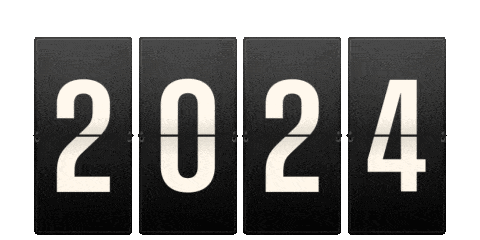Animation by Tomasz Czajka / For The Times; photographs from Warner Bros. Pictures, DNA Films, Peacock and Zoic Studios / Sci Fi Channel
- Share via
When SAG-AFTRA President Fran Drescher addressed the audience gathered at the Shrine Auditorium during this year’s Screen Actors Guild Awards, she hammered home what many understand to be the industry’s most urgent threat: artificial intelligence.
“AI will entrap us in a matrix where none of us know what’s real,” she warned. “If an inventor lacks empathy and spirituality, perhaps that’s not the invention we need. Dystopia stories can also become a self-fulfilling prophecy.”
Drescher’s words spoke to the continued relevance of the sci-fi world dreamed up by the Wachowski sisters 25 years ago. Since its initial release on March 31, 1999, “The Matrix” has stood as a forceful example of the encroaching dangers of AI and the need to embrace one’s humanity to stop it.
The 1999 Project
All year we’ll be marking the 25th anniversary of pop culture milestones that remade the world as we knew it then and created the world we live in now. Welcome to The 1999 Project, from the Los Angeles Times.
The battle between mankind and the film’s titular machinery, which has been secretly harvesting humans’ bioelectric energy to keep itself afloat, is presented as the fight between Neo (Keanu Reeves) and Agent Smith (Hugo Weaving). Reeves’ Chosen One is figured as the great hope for those who have been dormant and fooled. The kind who can stand up against those hoping to keep you entrapped.
Throughout the film, Neo learns to discern what’s real and what’s not. And it is his empathy and his love that eventually fuel his victory over the Matrix’s many threats, Weaving’s Agent Smith included.
One of the most terrifying aspects of the film is how mundane it makes AI’s menace appear. As his name suggests, Agent Smith is nothing more than a monotone parody of FBI G-men.
When addressing Neo as “Mister Anderson” with a decidedly sibilant ess as robotic as it is arrogant, Weaving makes his character’s disaffected voice unsettling precisely because of how familiar it sounds. In “The Matrix,” Weaving mapped the place we now call “the uncanny valley.”
This Y2K vision of AI was built on decades’ worth of androids and cyborgs and Cylons, of course. But where Hollywood had often opted for rigid performances that betrayed their robotic nature, Agent Smith presaged what’s so eerie about AI today: When Neo first sees Smith and his henchmen looking for him in his dull, cubicle-latticed office, they look and seem no different than the many drone-like workers around him.
Compare that to, say, the Terminator, arguably the most iconic AI villain of the late 20th century. In his 2023 Netflix docuseries, Arnold Schwarzenegger shared how he first envisioned his now much-copied role: The Terminator had “to be totally unlike a human being. The way he steps on the motorcycle. The way he runs. The way he gets up,” he said. Everything had to be “exactly like a machine.”
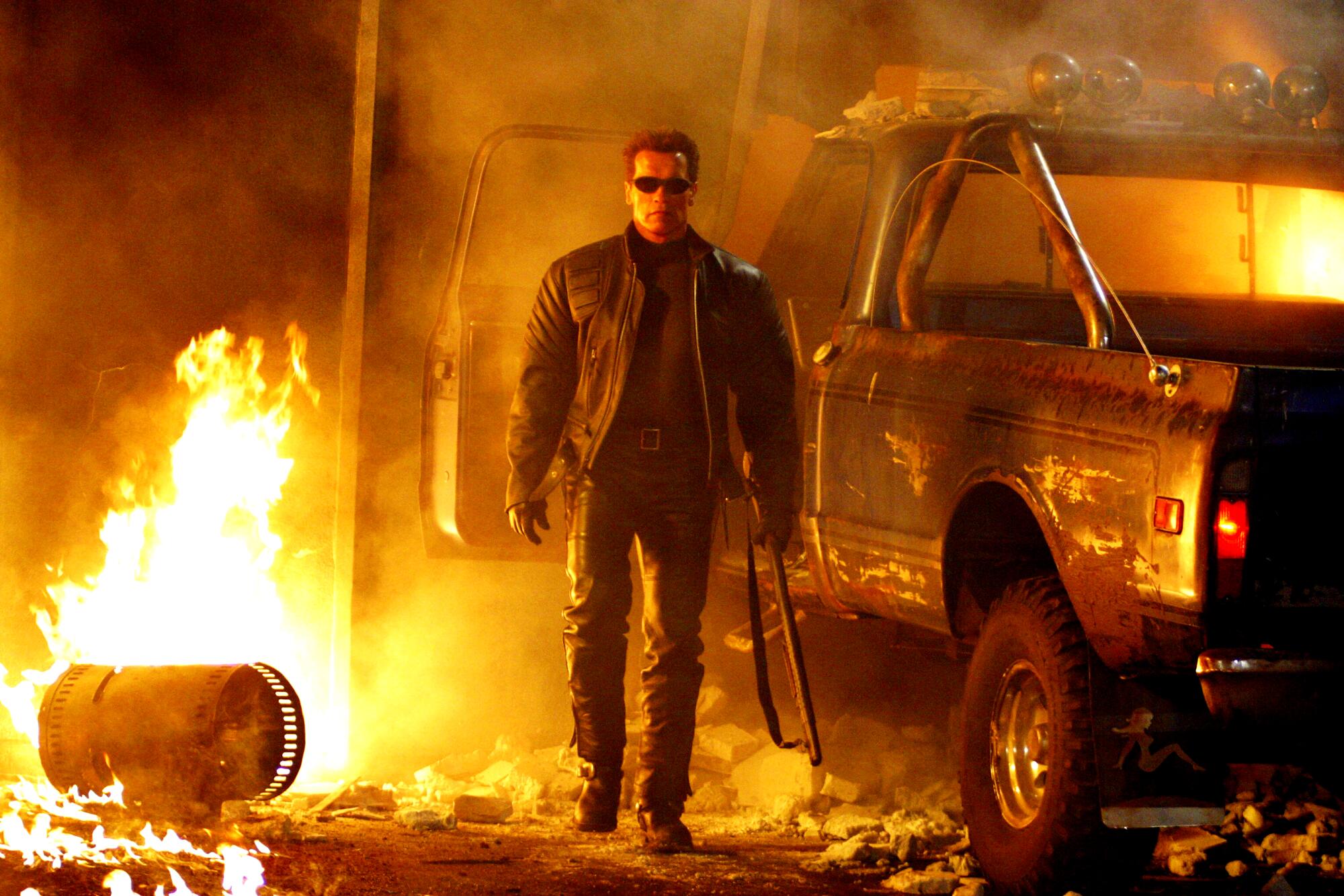
Much of the action (and arguably the humor) of “The Terminator” followed from the conceit that Schwarzenegger’s AI character was decidedly non-human. The bodybuilder-turned-actor’s bulked up body and accented English marked him as other, as unlike us.
For much of “The Matrix,” Agent Smith’s dark glasses (a nod, perhaps, to Arnold’s indelible image) add to his sense of imperious authority. He’s a replica of a government bureaucrat. There’s nothing behind those eyes; better to hide them and have him appear inscrutable, unreadable. But as the film unspools and Agent Smith comes face to face with Neo and his master Morpheus (Laurence Fishburne), Weaving begins showing signs that this AI is not so unfeeling, not so unbothered after all.
During key fight scenes, Agent Smith loses those glasses (they’re broken, tossed). And in his steely eyes you see an exasperation (desperation, even) at odds with the more mechanical traits that distinguish him from the humans he’s trying to control and contain.
As Neo’s physicality ends up cannily mirroring Agent Smith’s own, “The Matrix” arrives at an understanding of what’s most disorienting about the rise of AI: Not how easy it is to tell apart from humans, but how difficult.
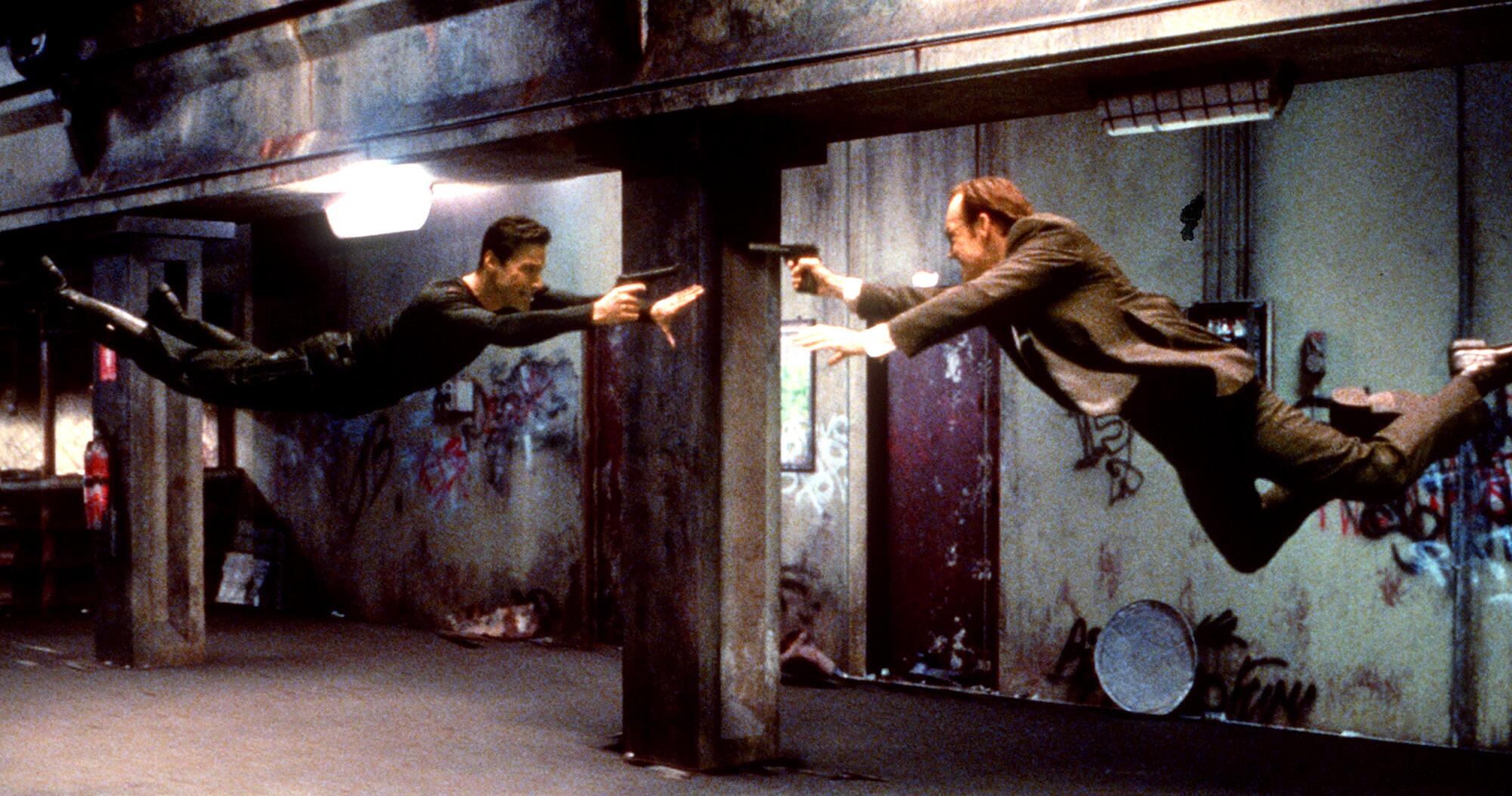
Given the accelerated pace at which technology at the turn of the millennium was advancing (“The Matrix’s” plot hinges on wired telephone connections, after all), it makes sense that the last 25 years have seen narratives about and depictions of artificial intelligence change similarly quickly.
No longer is AI (merely) a villainous foe to be vanquished (or unplugged). It has become an ever more sophisticated storytelling device through which to question the nature of our humanity. TV and films alike have asked, with increasing insistence , what will happen to us if we are to empathize with AI, if we are unable to dismiss it as mere tool (or antagonist) and find it, instead, mirroring the very emotions we thought it couldn’t embody.

Two years after “The Matrix” made rooting against AI a moral imperative, Steven Spielberg’s “A.I.: Artificial Intelligence” asked audiences, instead, to empathize with a “mecha” boy with a Pinocchio complex. Anchored by a moving, tellingly restrained performance from Haley Joel Osment, Spielberg’s unwieldy fable centered on childlike wonder and man-made cruelty.
Osment’s David is a doll-like presence whose screeching bursts of laughter and too-literal statements unnerve the parents who bring him home as a surrogate of sorts for the child they thought they’d lost for good.
What was most threatening about David was how devoted he was to wanting to be real, to wanting to be loved. He volleys for our sympathies throughout the film despite Osment’s performance telegraphing at every turn how artificial his being, his feelings and his reactions truly are.
Spielberg’s project feels indebted to “Blade Runner,” Ridley Scott’s 1982 adaptation of the Philip K. Dick novel “Do Androids Dream of Electric Sheep?”: The audience is asked to feel for replicants like Rachael (Sean Young) who, not unlike David, has trouble accepting her memories and life are wholly manufactured. Those fugitive replicants hunted by Harrison Ford’s Deckard are victims of their own creators whose tragedy lies in their inability to be (or live) more than what they were built for — a point made all the more poignant by Deckard’s realization at the end of the film that he may well be a replicant himself.
More recently, Kogonada’s “After Yang” picks up the same thread. The robotic teenager of the title becomes a vehicle through which the film explores memory, grief and what comforting company such a figure could offer the family that first bought him and now fears losing him.
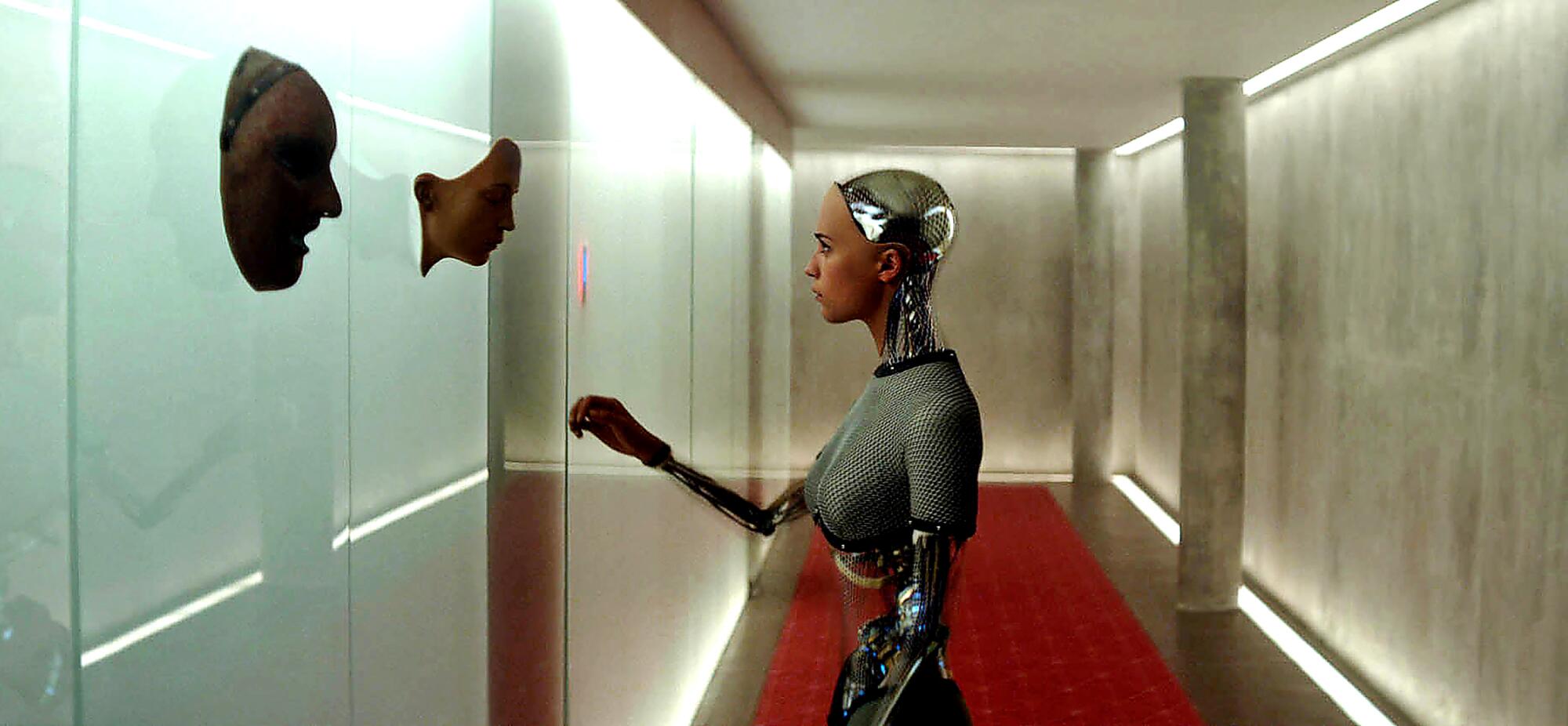
Therein lies the tension of contemporary AI narratives and AI performances. Whether in long-running TV series like “Battlestar Galactica” and “Westworld” or in inventive big-screen character studies such as “Her” and “Ex Machina,” artificial intelligence is no longer so easily vilified as an existential threat to mankind — perhaps because, in the real world, we have already learned to live with it, rely on it, in ways that go far beyond Sora or ChatGPT.

Indeed, such stories are now more often rooted in the equally horrifying notion that AI could fool us into thinking it’s as sentient and as caring as we are: To hear Hollywood tell it, AI is close to fooling us into forgetting what it is and what it represents.
Consider the modern-day reboots of “Battlestar Galactica” and “Westworld,” in which the right against AI is so challenging precisely because of the technology’s ability to confound human perception.
Amid plots about characters who suddenly learn they’ve been living in a world programmed for them — not unlike Neo — and others about such man-made creations eager to become more human — not unlike David — these banner series made sure to stress how vulnerable, how human, AI can get. Actors like Tricia Helfer and Grace Park in the former, and Evan Rachel Wood and Thandie Newton in the latter, imbued their respective AI characters with warmth, empathy and humor. So advanced were their dystopias’ technology that even viewers at home couldn’t tell human and AI apart.
Turning this premise into shocking reveals and season-long arc was only possible because the series insisted cast members themselves observe a porous distinction between AI characters and its human ones. At the far extreme, Spike Jonze’s “Her” tells the story in reverse: Though the film is ostensibly about how Theodore Twombly (Joaquin Phoenix) falls in love with his sentient operating system, Samantha (voiced by Scarlett Johansson), it’s the AI who begins her life with no fears and anxieties, only to end up afflicted by a neurosis that drives her away from her lover and humanity altogether.
Samantha’s voice doesn’t drone like HAL 9000 in “2001: A Space Odyssey” (voiced by Douglas Rain, and technologically altered). Nor is she comparable to “WALL-E’s” Auto (voiced by the text-to-speech program for Apple Macintosh computers). More sultry than Siri, she sounds more like a girl you’d call in the middle of the night — a creative decision instrumental in selling “Her’s” improbable romance.

Similarly, Alex Garland’s 2015 feature “Ex Machina” finds lone genius Nathan Bateman (Oscar Isaac) unleashing Ava (Alicia Vikander), an AI he believes will pass the Turing test, onto an unsuspecting employee, Caleb Smith (Domhnall Gleeson).
The initially terse and eventually more romantically and erotically charged interactions between the lithe robot girl and the wide-eyed coder soon have audience and Caleb (and Nathan) wondering whether Ava is indeed passing this “imitation game.” Or whether, in an even more damning indictment of all involved, she’s fooled them both with her wily, seductive ways.
That she has is central to the thrill of “Ex Machina,” in which Vikander deftly navigates the many levels of deception and performance the role of Ava demands. At first she’s coy, if aloof; eventually her interactions with Caleb are utterly disarming. It’s no surprise he’s so taken by her. She’s quite lifelike. A damsel, even if only in his imagination. Even if only by her own design.
These depictions place the existential threat of AI squarely where it belongs: at the moment where you stop thinking of it as a tool or an object or an invention or a sci-fi villain and start thinking of it as a well-rounded character worthy of a name, a story, an arc.
If “The Matrix’s” Agent Smith is at the start of this transformation, “Mrs. Davis,” from Tara Hernandez and Damon Lindelof, is its culmination — at least for now. What drives Betty Gilpin’s Sister Simone so crazy for much of the Peacock limited series is how users all over the world have warmed up to an all-powerful algorithm, giving it — her — a name worthy of a kindergarten teacher.
But this AI doesn’t have a singular form. Instead, every time Simone interfaces with the algorithm she’s hoping to turn off, she has to speak with and through a human proxy: “Mrs. Davis” is constantly made human by those devoted to her, a case not of AI entrapping us, as Drescher ominously warns us, but us entrapping ourselves.
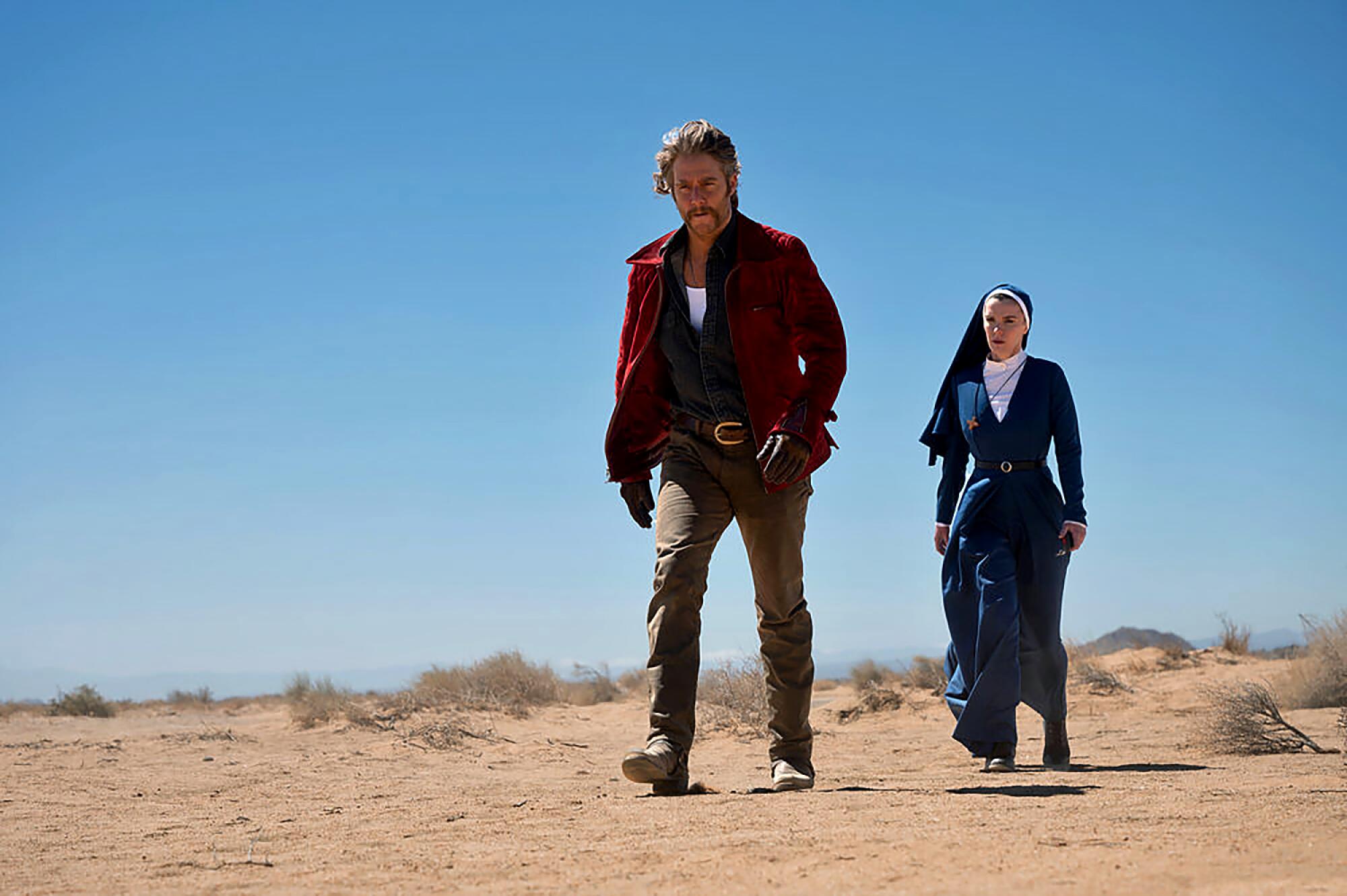
Maybe this is why “The Matrix” now feels more prescient than ever. In their iconic sci-fi flick, the Wachowskis had bottled up what felt so stultifying about our relationship with technology at the turn of the millennium, way before C-suite execs, tech entrepreneurs and would-be “creatives” would reduce artistic talent to a digital prosthetic.
Since then, dystopian stories have regularly leveraged our empathy toward AI, framing it as almost-human. There’s no better way to rid ourselves of that notion than to go back into the Matrix and remember that AI is far more dangerous, right now, as a corporate weapon to be wielded against workers — a villain best symbolized by a humorless, middle-aged man in a business suit.
More to Read
Only good movies
Get the Indie Focus newsletter, Mark Olsen's weekly guide to the world of cinema.
You may occasionally receive promotional content from the Los Angeles Times.

